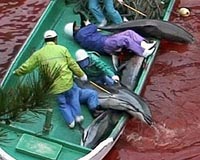 |
Nagoya, Japan (AFP) Oct 27, 2010 Japan announced Wednesday a two-billion-dollar environment rescue package for developing countries in a bid to kick-start tense UN talks aimed at securing a pact on saving biodiversity. Prime Minister Naoto Kan said Japan wanted to help lead the world in protecting the world's animals and plants from extinction, and offered the money to poor nations over the next three years. "Our generation must resist the ongoing extinction and bequeath to future generations our rich and abundant earth," Kan said as he unveiled his government's aid package that would be spent on protecting ecosystems. Kan was addressing delegates from more than 190 countries who are in the central Japanese city of Nagoya trying to broker a treaty aimed at ending the world's rapid loss of biodiversity. The 12-day event is due to end on Friday with the United Nations aiming for a 10-year plan that would include commitments for protecting forests, cutting pollution and other ways to save ecosystems. UN chiefs at the conference have highlighted scientists' warnings that humans' destruction of ecosystems are causing the world's plant and animal species to vanish at up to 1,000 times the natural rate. But while delegates in Nagoya have said they are aware of the threats, the talks have become bogged down in the kinds of disputes between rich and poor nations that have plagued the UN's climate change negotiations. One point of tension has been an insistence from developing countries that rich nations commit to helping them financially to save their rainforests, waterways, wetlands and other ecosystems. In this regard, Japan's announcement improved the mood in Nagoya -- even though there were few details about where the money would be spent and the break-up between direct aid and loans. Brazil, which has been a leading voice for developing countries, cautiously welcomed Japan's offer as it waited for more information on whether the money would be on top of previous commitments. "That's good news," Brazilian Environment Minister Izabella Teixeira told AFP via email. "For us, in Brazil, I think it's very important to highlight that new funds, additional money, are absolutely important for the next phase (of negotiations)." Environmental group Greenpeace, which is part of the large civil society movement also involved in the talks, praised Japan for its leadership. "This is a great start, that Japan is providing concrete figures to protect life on Earth. We hope it provides an example for other countries to do the same," Greenpeace Japan's ocean campaigner, Wakao Hanaoka, told AFP. If all goes to plan, a deal on Friday would see countries commit to 20 targets on saving biodiversity. These would include pledges on protecting fisheries and forests, cutting pollution levels and restoring degraded ecosystems. But another major dispute aside from the financing issue still threatens to derail the event. Brazil has said many developing countries will not agree on a broad pact unless there is also a binding legal protocol on "fairly and equitably" sharing genetic resources. Developing countries argue rich countries and companies have been allowed for too long to take genetic resources, such as wild plants, and use them to make medicines, cosmetics and other products for huge profits. Under the proposed "Access and Benefit Sharing Protocol", companies would have to pay people in developing countries for taking the indigenous products and the knowledge of how to use them. Delegates from opposing sides said a deal on ABS was possible in Nagoya, but that deep divides on the issue remained and time was running out to clinch a deal. Meanwhile, green groups expressed concern that some developing countries were trying to water down elements of the strategic plan so much that they would be nearly meaningless.
Share This Article With Planet Earth
Related Links Darwin Today At TerraDaily.com
 Dolphin activists to meet mayor in Japan's 'Cove' town
Dolphin activists to meet mayor in Japan's 'Cove' townTokyo (AFP) Oct 27, 2010 Japan's dolphin-hunting town of Taiji, put under the spotlight in the Oscar-winning eco-documentary "The Cove", will host a meeting with environmental activists next week. Every year fishermen in Taiji herd about 2,000 dolphins into a secluded bay, select several dozen for sale to aquariums and marine parks and slaughter the rest for meat, a practice long deplored by animal rights campaigner ... read more |
|
| The content herein, unless otherwise known to be public domain, are Copyright 1995-2010 - SpaceDaily. AFP and UPI Wire Stories are copyright Agence France-Presse and United Press International. ESA Portal Reports are copyright European Space Agency. All NASA sourced material is public domain. Additional copyrights may apply in whole or part to other bona fide parties. Advertising does not imply endorsement,agreement or approval of any opinions, statements or information provided by SpaceDaily on any Web page published or hosted by SpaceDaily. Privacy Statement |